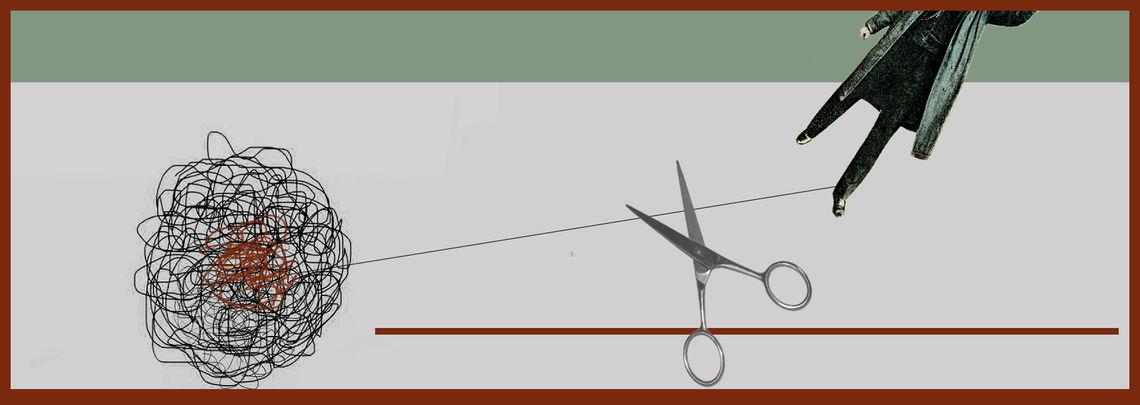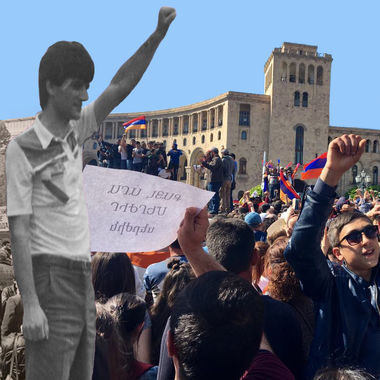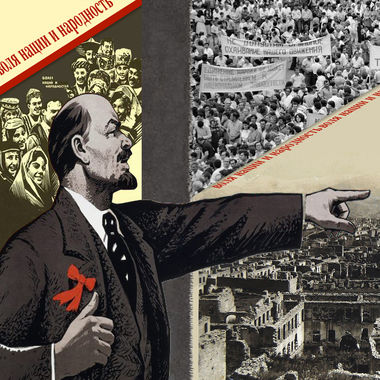
Recent events in Echmiadzin, and their continuation, namely the arrest of Member of Parliament Manvel Grigoryan on June 16, and the support he has received from the Republican Party of Armenia (RPA) faction in parliament, are a reminder that while the first phase of the revolution may have ended on May 8, many challenges still lie ahead.
Historians know that one of the most dangerous periods in a revolution is when the old government has collapsed, but the new one has not taken root yet. “Revolutionary” governments often face threats both from the “counter-revolution,” i.e. the remnants of the ancien régime, and from radicals within the revolutionary camp. A country that has undergone a revolution also often faces external threats, from neighboring governments who may fear “revolutionary contagion” or may try to use the instability accompanying a revolution to settle old scores. Examples of such threats in history are abundant, from the royalist uprising in France’s Vendee region and the war of Europe’s monarchs against revolutionary France, to more recent cases, such as the Iran-Iraq war, that started in the wake of the 1979 Iranian Revolution, or the 2013 coup d’etat in Egypt.
These are theoretical considerations and historical examples, which, luckily, have no immediate connection to the situation in Armenia. The fact that the Armenian revolution was completely peaceful and the transfer of power was carried out in accordance with constitutional norms, also decreases the probability of violent incidents within the country, as well as that of an external intervention. Obviously, the threat of escalation in Artsakh is present, but this factor, unfortunately, has been present for decades (we shall talk more about that in the second part of this article). So, there is no reason to panic. Yet, I believe, Armenian society needs to be alert to the possible dangers of the post-revolutionary situation.
An obvious danger is the continued resistance of the remains of the ancien régime. One could argue that the survival of the former ruling party, acting in the capacity of an opposition, is not necessarily a bad thing for post-revolution Armenia, as it could help to balance the political system and prevent a possible slide into authoritarianism, which is something that often happens to revolutionary governments. However, I believe, this argument hardly applies to the Republican Party of Armenia (RPA), at least in its current state, or, more precisely, to Serzh Sargsyan's political team. The problem with RPA and Serzh Sargsyan’s team is that they have been so closely intertwined with the informal networks of corruption and shadow governance, that their political survival is virtually impossible without the survival of these criminal-oligarchic networks. Dismantling the system of corruption and oligarchy is perceived as a mortal danger by many representatives of the ancien régime, so they can be expected to fiercely resist the new government's anti-corruption efforts and other reforms. The support that someone like Manvel Grigoryan, who has a reputation of an extremely corrupt local “feudal” lord, and who has virtually “owned” Echmiadzin for years, has received from the RPA faction, serves as a perfect example to prove that point.
Besides, one should not underestimate the degree of revanchist sentiment among the ancien régime supporters. There is a famous quote, attributed to French diplomat Talleyrand, speaking about the Bourbon dynasty, which returned to power in France after the abdication of Napoleon: “They had forgotten nothing and learned nothing.” In a post on Facebook, an experienced Armenian diplomat used this quote to describe Armenia’s Republicans, after the (in)famous vote in Parliament on May 1. Arguably, this formula can describe the mindset of many of the ancien régime supporters today.
Hence, since “New Armenia” does need a strong opposition to counter-balance Pashinyan’s government, it is in the interests of the country that a new opposition is formed, which should be free of the criminal-oligarchic connections of the ancien régime. The best scenario for the country would be if this new opposition came from the ranks of participants of the “Velvet Revolution” as that would mean that no matter what the fate of the current revolution, no return to the corrupt authoritarian system of the past is possible. Such an opposition would not only enjoy the backing of at least a part of society, but also, it would perceive Pashinyan’s government as competitors, and not as “mortal enemies.” However, as long as the Republican Party continues to resist the efforts of the new government, various political forces and groups that took part in the “Velvet Revolution” will remain in Pashinyan’s camp, even if they disagree with Pashinyan on some issues, since adopting an opposition stance can be seen as “treason” of the values of the revolution and will not go well with the voters. Thus, the continued existence of RPA as a political force hinders the creation of a new opposition.
In theory, it is also possible to imagine a situation, in which the Republican Party goes through a thorough transformation, rids itself of the criminal-oligarchic elements, recognizes and condemns the crimes and mistakes of the past, and becomes a respectable center-right party, which some of its younger members claim it is. However, the fact that Serzh Sargsyan and his close associates still run the Republican Party makes such an optimistic scenario virtually impossible, at least in the foreseeable future. Sargsyan's team members control various important posts all over the country, including, for example, such key positions as the Yerevan Municipality. The Republican faction in the parliament still retains strong positions in the parliament, even though it ceased to be a majority. Serzh Sargsyan's allies, it seems, still have a foothold in many cities and regions of Armenia, as well as in the Republic of Artsakh. Arguably, officials loyal to Sargsyan can be found in various parts of the government apparatus. While the perspective of the return of Sargsyan’s team to power seems implausible, still, they can sabotage the decisions of the new government and thus hinder the process of reform.
The dynamic of the political process suggests that the danger of resistance from the remains of the ancien régime is diminishing. However, this is not the only factor that can hinder the success of post-revolution Armenia. Obviously, before the revolution corruption and oligarchy had not been confined to the Republican Party. While Republicans chose to resist till the end, various elements of the old system may still remain in place through a different path: that of aligning with the new government and nominally supporting its agenda, while in reality continuing their corrupt practices. To an extent, this is what happened in Ukraine under Poroshenko’s government, being one of the reasons why the new government there has not been able or willing to eliminate corruption. Another danger, albeit purely theoretical at this point, is that a slow pace of change may lead to emergence of radical factions within the “revolutionary” camp.
But these are topics for different articles.
by the same author
Is 2018 the New 1988?
By Mikayel Zolyan
In this new piece, Mikayel Zolyan writes about the similarities and differences between the 1988 Karabakh Movement and the 2018 Velvet Revolution - what it meant for people then and now and lessons to be learned.
How It All Began: The Soviet Nationalities Policy and the Roots of the Karabakh Problem
By Mikayel Zolyan
Long before the first rallies and clashes over the territory of Nagorno Karabakh, there were several signs of the coming storm writes Mikayel Zolyan. One of these was the “war of memory,” waged not by soldiers, but in the sphere of historiography.





